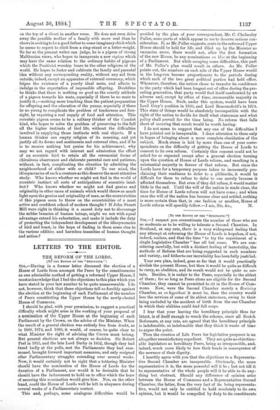LETTERS TO THE EDITOR.
THE REFORM OF THE LORDS.
[TO THE EDITOR OF THE "SPECTATOR."'
81)4 —Having in a former letter discussed the election of a House of Lords from amongst the Peers by the constituencies as one admissible method of getting a reformed Upper House, I must acknowledge that I feel the objections to this plan which you have atated in your last number to be quite unanswerable. I do not, however, think that these objections tell so-forcibly against the election at the beginning of each Parliament of the number of Peers constituting the Upper House by the newly-elected House of Commons.
I should be glad, with your permission, to suggest a practical difficulty which might arise in the working of your proposal of a nomination of the Upper House at the beginning of each Parliament by the Crown, on the advice of the Minister. When the result of a general election was entirely free from doubt, as in 1868, 1874, and 1880, it would, of course, be quite clear to what Minister the right of advising the Crown must belong. But general elections are not always so decisive. Sir Robert Peel in 1835, and the late Lord Derby in 1852, though they had -fared badly at the polls, met the Parliaments they had sum- moned, brought forward important measures, and only resigned after Parliamentary struggles extending over several weeks. Now, it would certainly not be right that a tottering Minister should have the nomination of the House of Lords for the duration of a Parliament, nor would it be desirable that he should have the inducement to hold on to office which the hope of securing this nomination would give him. Nor, on the other hand, could the House of Lords well be left in abeyance during several weeks of a Parliamentary contest.
This and, perhaps, some analogous difficulties would be
avoided by the plan of your correspondent, Mr. C. Cholmeley Puller, some parts of which appear to me to deserve serious con- sideration. If, as Mr.Puller suggests, seats in the reformed Upper House should be held for life, and filled up by the Minister as vacancies arose, there would not, after the first formation of the new House, be any nominations en bloc at the beginning of a Parliament. But while escaping some difficulties, this part of Mr. Puller's plan would result in others. As Mr. Puller points out, the numbers on each side of the -Upper House would in the long-run become proportionate to the periods daring which each of the two great political parties had held office. Whenever, therefore, the nation chose to transfer its confidence to the party which had been longest out of office during the pre- ceding generation, that party would find itself confronted by an adverse and, except by efflux of time, irremovable majority in the Upper House. Such, under this system, would have been Lord Grey's position in 1830, and Lord Beaconsfield's in 1874. This state of things would be absolutely incompatible with the right of the nation to decide for itself what statesman and what policy shall prevail for the time being. No reform that falls short of securing that result would be worth having.
I do not mean to suggest that any one of the difficulties I have pointed out is insuperable. I draw attention to them only in hopes of bringing about a more complete elucidation of the subject. Much stress is laid by more than one of your corre- spondents on the difficulty of getting the House of Lords to consent to its own reform. Certainly this consent could not be asked for or expected except after a general election turning upon the question of House of Lords reform, and resulting in a substantial majority in favour of that reform. But since the Lords have for a temporary purpose taken to incessantly pro- claiming their readiness to defer to a plebiscite, it would be difficult for them to refuse to defer to one merely because it -affected themselves. But even if they did refuse, it would matter little in the end. Until the will of the nation is made clear, the time for House of Lords reform will not have come ; and when once the will of the nation has become clear and settled, nothing is more certain than that, in one fashion or another, House of
Lords reform will speedily follow.—I am, Sir, &c., M.


































 Previous page
Previous page